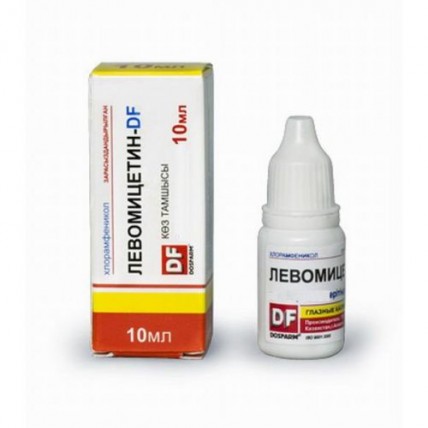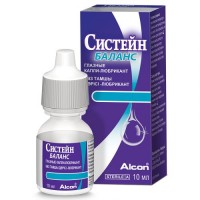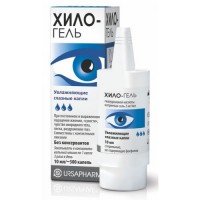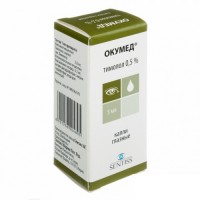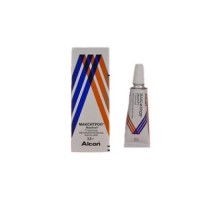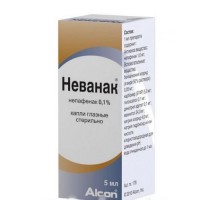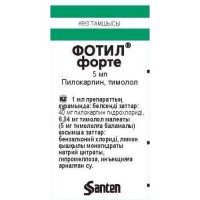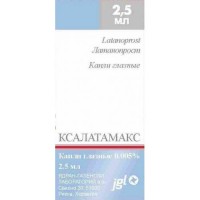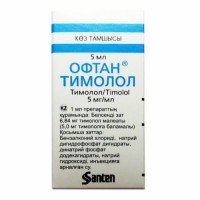Chloramphenicol - DF 0,5% 10 ml of eye drops
- $4.10
LEVOMITSETIN-DF
the Trade name
of Levomitsetin-DF
the International unlicensed
name Chloramphenicol
Structure
of 1 ml of drug contains
active agent - chloramphenicol - 5 mg
excipients: boric acid, water for injections.
The description
Transparent colourless liquid
Pharmacotherapeutic group
Drugs for treatment of diseases of eyes. Antibiotics.
The ATX S01AA01 code
the Pharmacological
Pharmacokinetics At properties of instillation of drug in an eye happens intraocular and partially system absorption. At the same time therapeutic concentration of chloramphenicol are created in a vitreous, a cornea, an iris of the eye, watery moisture of an eye (chloramphenicol does not get into a crystalline lens).
A pharmacodynamics
Chloramphenicol - a bacteriostatic antibiotic of a broad spectrum of activity. The mechanism of antimicrobial action is connected with disturbance of protein synthesis of microorganisms.
Works bacteriostatically. It is active concerning gram-positive (staphylococcus and streptococci) and gram-negative cocci (a gonokokka, a meningokokka), many bacteria (an intestinal and hemophilic stick, salmonellas, shigellas, klebsiyella, serration, iyersiniya, proteas), rickettsiae, spirochetes. Drug is active concerning the strains resistant to penicillin, streptomycin, streptocides.
Indications
- conjunctivitis
- a keratitis
-
- blefarokonjyunktivit blefarita
- a keratoconjunctivitis
- a neuroparalytic keratitis in the presence of consecutive bacterial
infection
- trachoma
- at inefficiency or intolerance of drugs of penicillin, tetracycline, streptocides
the Route of administration and doses
Drug is dug in in a conjunctival sac:
to children from 1 year to 8 years – on 1 drop in each eye 3-4 times a day
to children are more senior than 8 years and the adult - on 1-2 drop in each eye 3-4 times a day.
Course of treatment of 5-7 days.
Side effects
- are possible local allergic reactions
- in the first seconds after burying perhaps fast-taking place
burning
- at prolonged use - decrease in visual acuity
- neuritis visual and peripheral nerves
of the Contraindication
- hypersensitivity to drug components
- individual intolerance
- skin diseases (psoriasis, eczema, fungal infections)
- a sharp intermittent porphyria
- oppression of a marrowy hemopoiesis
- deficit glyukozo-6-fosfatdegidrogenazy
- pregnancy and the period of a lactation
- children's age till 1 year
Medicinal interactions
Co-administration of chloramphenicol with the drugs oppressing a hemopoiesis (streptocides, cytostatics) influencing a metabolism in a liver with radiation therapy - increases risk of development of side effect.
At simultaneous use with erythromycin, clindamycin, lincomycin the mutual weakening of action is noted because chloramphenicol can force out these drugs from the connected state or interfere with their linking with a subunit 50S of bacterial ribosomes.
When assigning with oral hypoglycemic drugs strengthening of their action due to suppression of metabolism in a liver and increases in their concentration in plasma is noted.
Chloramphenicol suppresses the fermental system of P450 cytochrome therefore at simultaneous use with barbiturates, Phenytoinum, indirect anticoagulants note weakening of metabolism of these drugs, delay of removal and increase in their concentration in plasma.
Reduces antibacterial effect of aminoglycosides, penicillin, polymyxin B, tetracyclines, cephalosporins, erythromycin. Also it is not compatible to ascorbic acid, a hydrocortisone, group B vitamins.
Special instructions
it is not necessary to appoint drug with the preventive purpose. Unreasonable appointment of drug and its use at easy forms of infectious diseases is not allowed, especially in children's practice.
In the course of treatment the systematic control of a picture of peripheral blood is necessary.
With care appoint to the patients receiving earlier treatment by cytostatic drugs or radiation therapy.
The feature of influence of medicine on ability to run the vehicle or potentially dangerous mechanisms
needs to be careful at control of motor transport or potentially dangerous mechanisms.
Overdose
Symptoms: decrease in visual acuity
Treatment: drug withdrawal
the Form of release and packing
On 5 or 10 ml of drug spill in the plastic bottles droppers corked by caps with control of the first opening.
On each bottle paste labels from paper label.
On one bottle together with the instruction for medical use in the state and Russian languages place in a pack from cardboard.
To Store storage conditions in the place protected from light, at a temperature from 18 °C to 25 °C.
To store out of children's reach!
The period of storage
After opening of a bottle drug is suitable 2 years within 15 days.
Not to apply after an expiration date.
Prescription status
According to the prescription
DOSFARM LLP Producer, Kazakhstan, 050034, Almaty, Chaplygin St., 3
the Owner of the registration certificate
of DOSFARM LLP, Kazakhstan, 050034, Almaty, Chaplygin St., 3
the Address of the organization accepting in the territory of the Republic of Kazakhstan claims from consumers on quality of products
of DOSFARM LLP, Kazakhstan, Almaty, Chaplygin St., 3, ph./fax: (727) 253-03-88, el. address: dospharm@dospharm.kz
the Trade name
of Levomitsetin-DF
the International unlicensed
name Chloramphenicol
Structure
of 1 ml of drug contains
active agent - chloramphenicol - 5 mg
excipients: boric acid, water for injections.
The description
Transparent colourless liquid
Pharmacotherapeutic group
Drugs for treatment of diseases of eyes. Antibiotics.
The ATX S01AA01 code
the Pharmacological
Pharmacokinetics At properties of instillation of drug in an eye happens intraocular and partially system absorption. At the same time therapeutic concentration of chloramphenicol are created in a vitreous, a cornea, an iris of the eye, watery moisture of an eye (chloramphenicol does not get into a crystalline lens).
A pharmacodynamics
Chloramphenicol - a bacteriostatic antibiotic of a broad spectrum of activity. The mechanism of antimicrobial action is connected with disturbance of protein synthesis of microorganisms.
Works bacteriostatically. It is active concerning gram-positive (staphylococcus and streptococci) and gram-negative cocci (a gonokokka, a meningokokka), many bacteria (an intestinal and hemophilic stick, salmonellas, shigellas, klebsiyella, serration, iyersiniya, proteas), rickettsiae, spirochetes. Drug is active concerning the strains resistant to penicillin, streptomycin, streptocides.
Indications
- conjunctivitis
- a keratitis
-
- blefarokonjyunktivit blefarita
- a keratoconjunctivitis
- a neuroparalytic keratitis in the presence of consecutive bacterial
infection
- trachoma
- at inefficiency or intolerance of drugs of penicillin, tetracycline, streptocides
the Route of administration and doses
Drug is dug in in a conjunctival sac:
to children from 1 year to 8 years – on 1 drop in each eye 3-4 times a day
to children are more senior than 8 years and the adult - on 1-2 drop in each eye 3-4 times a day.
Course of treatment of 5-7 days.
Side effects
- are possible local allergic reactions
- in the first seconds after burying perhaps fast-taking place
burning
- at prolonged use - decrease in visual acuity
- neuritis visual and peripheral nerves
of the Contraindication
- hypersensitivity to drug components
- individual intolerance
- skin diseases (psoriasis, eczema, fungal infections)
- a sharp intermittent porphyria
- oppression of a marrowy hemopoiesis
- deficit glyukozo-6-fosfatdegidrogenazy
- pregnancy and the period of a lactation
- children's age till 1 year
Medicinal interactions
Co-administration of chloramphenicol with the drugs oppressing a hemopoiesis (streptocides, cytostatics) influencing a metabolism in a liver with radiation therapy - increases risk of development of side effect.
At simultaneous use with erythromycin, clindamycin, lincomycin the mutual weakening of action is noted because chloramphenicol can force out these drugs from the connected state or interfere with their linking with a subunit 50S of bacterial ribosomes.
When assigning with oral hypoglycemic drugs strengthening of their action due to suppression of metabolism in a liver and increases in their concentration in plasma is noted.
Chloramphenicol suppresses the fermental system of P450 cytochrome therefore at simultaneous use with barbiturates, Phenytoinum, indirect anticoagulants note weakening of metabolism of these drugs, delay of removal and increase in their concentration in plasma.
Reduces antibacterial effect of aminoglycosides, penicillin, polymyxin B, tetracyclines, cephalosporins, erythromycin. Also it is not compatible to ascorbic acid, a hydrocortisone, group B vitamins.
Special instructions
it is not necessary to appoint drug with the preventive purpose. Unreasonable appointment of drug and its use at easy forms of infectious diseases is not allowed, especially in children's practice.
In the course of treatment the systematic control of a picture of peripheral blood is necessary.
With care appoint to the patients receiving earlier treatment by cytostatic drugs or radiation therapy.
The feature of influence of medicine on ability to run the vehicle or potentially dangerous mechanisms
needs to be careful at control of motor transport or potentially dangerous mechanisms.
Overdose
Symptoms: decrease in visual acuity
Treatment: drug withdrawal
the Form of release and packing
On 5 or 10 ml of drug spill in the plastic bottles droppers corked by caps with control of the first opening.
On each bottle paste labels from paper label.
On one bottle together with the instruction for medical use in the state and Russian languages place in a pack from cardboard.
To Store storage conditions in the place protected from light, at a temperature from 18 °C to 25 °C.
To store out of children's reach!
The period of storage
After opening of a bottle drug is suitable 2 years within 15 days.
Not to apply after an expiration date.
Prescription status
According to the prescription
DOSFARM LLP Producer, Kazakhstan, 050034, Almaty, Chaplygin St., 3
the Owner of the registration certificate
of DOSFARM LLP, Kazakhstan, 050034, Almaty, Chaplygin St., 3
the Address of the organization accepting in the territory of the Republic of Kazakhstan claims from consumers on quality of products
of DOSFARM LLP, Kazakhstan, Almaty, Chaplygin St., 3, ph./fax: (727) 253-03-88, el. address: dospharm@dospharm.kz
